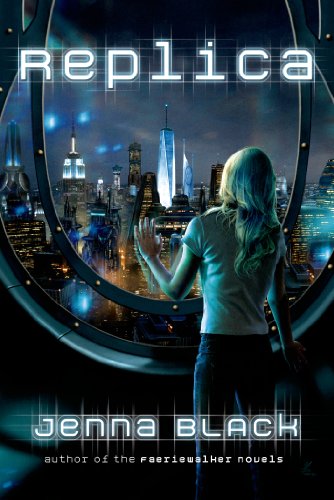All Nonfiction
- Bullying
- Books
- Academic
- Author Interviews
- Celebrity interviews
- College Articles
- College Essays
- Educator of the Year
- Heroes
- Interviews
- Memoir
- Personal Experience
- Sports
- Travel & Culture
All Opinions
- Bullying
- Current Events / Politics
- Discrimination
- Drugs / Alcohol / Smoking
- Entertainment / Celebrities
- Environment
- Love / Relationships
- Movies / Music / TV
- Pop Culture / Trends
- School / College
- Social Issues / Civics
- Spirituality / Religion
- Sports / Hobbies
All Hot Topics
- Bullying
- Community Service
- Environment
- Health
- Letters to the Editor
- Pride & Prejudice
- What Matters
- Back
Summer Guide
- Program Links
- Program Reviews
- Back
College Guide
- College Links
- College Reviews
- College Essays
- College Articles
- Back
Replica by Jenna Black
In the vast and varying world that is Young Adult (YA) fiction, one would think that unoriginal plots and mechanical characters would be a little less common.
Unfortunately, it seems that novels highlighting fresh ideas and good writing are becoming harder and harder to discover, as they are thoroughly hidden amongst the almost unimaginably huge amount of mediocrity.
As exciting as it would be to review an exception to the growing number of badly written YA novels, it seems that chance will not have it. Instead, I believe that I was intended to read this book so that all of you would not have to.
The suspect in question is Replica by Jenna Black. Released only a few months ago, this book has yet to cause a dent in the literary world and probably never will. Don’t get me wrong – to say it’s the worst book I’ve read in a long time would be an overstatement. But the biggest let-down about the novel is the unfulfilled potential it had to be great. It frustrates me so much when a story starts off with just enough intrigue and promise to get the reader’s hopes up, only to be completely destroyed by the third chapter.
In theory, Replica sounds like an idea that is a touch overdone but still has plenty of room to extend outside the pre-determined Teen Science Fiction Box. Two main characters, Nadia Lake and Nate Hayes, live in a futuristic, corporate society that “used to be” New York, arranged to be married with the usual quantities of complications and unreciprocated feelings. Before the reader can begin to grasp the “future” lingo and come to terms with this new world, or much less the protagonists, Nate’s character is killed off, only to be immediately and unemotionally replaced by a “Replica,” an exact copy created in a vat of goo, charged with backed-up memories from the original.
From that point, the plot progresses imperceptibly. The characters are purely driven by two goals; Nate can seem to do nothing else except obsess over his murder, and Nadia is bent on the struggle between protecting her family’s reputation and helping her fiancée crack the case. In between all of this are annoying, unlikable side-characters who fall right into the stereotypical archetypes YA authors love to abuse.
More importantly, the main characters are nothing to scream about either. Despite every other chapter changing point of view between the two of them, Nadia and Nate were very unconvincing characters. Both seemed to lack the individual emphasis needed to truly set them apart from each other, an especially important factor in novels with shifting point of views. Beyond that, after a while, their inner narrative just got downright irritating. Major writing flaws became quite apparent only a few chapters in; not only did the story lack believable, mature dialogue, but it was almost entirely recounted in repetitive narration. It seemed to me after some time that I was merely re-reading the same information, said by a different character in a slightly different way.
Black gets some points for disobeying the usual law for teen fiction by creating two protagonists that weren’t madly in love with each other, but her development of both, and of the plot, fell through in all other aspects. That’s not to say she’s a bad writer; there were certain moments when I genuinely found myself caught up in some of the action. But it’s characters that impact me as a reader the most, and more than being unable to relate to Replica’s characters, I found myself not caring what happened to them one way or the other.
Perhaps the only solution to this epidemic of unoriginal YA fiction is for authors to take a break from dystopian novels. The whole trend seems so dead and tired that it’s no wonder writers of late see no other option but to take to the ironic inclusion of zombies to liven them up.
Similar Articles
JOIN THE DISCUSSION
This article has 0 comments.

